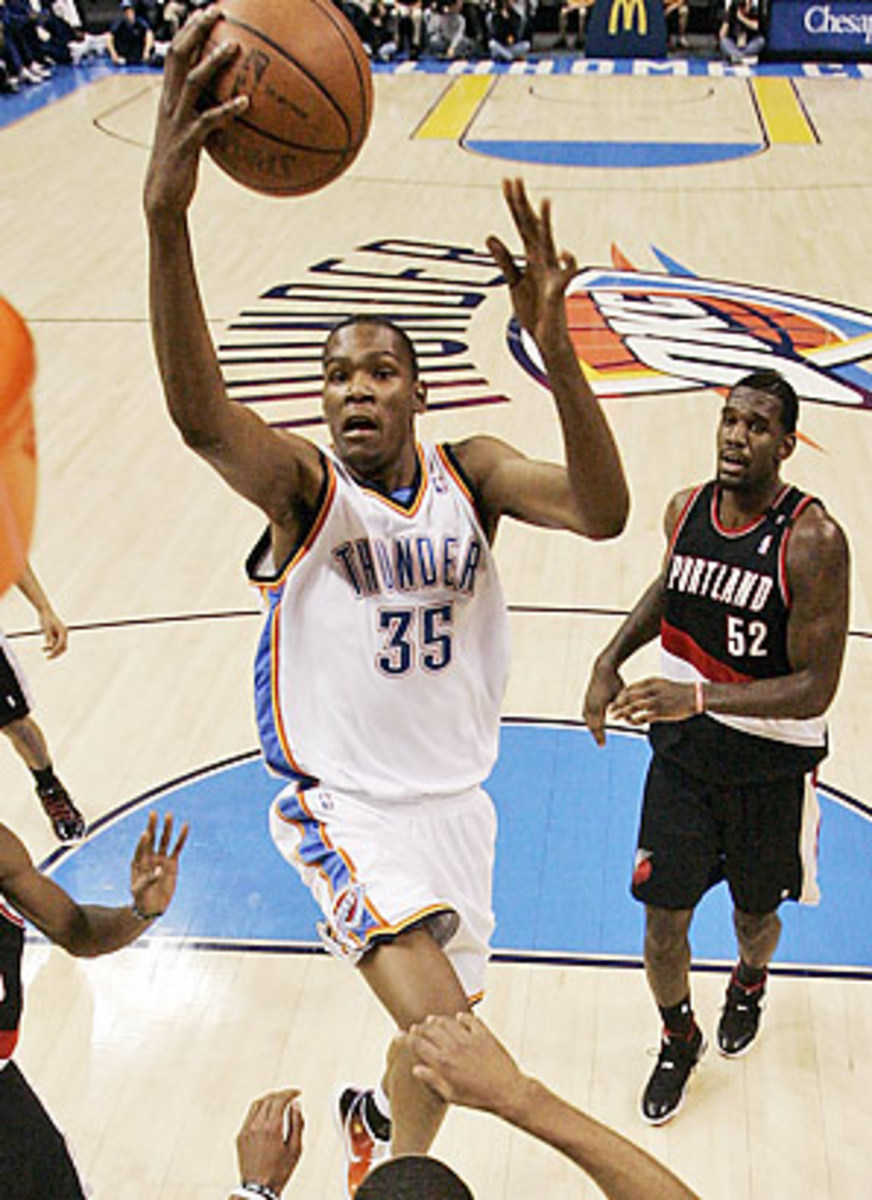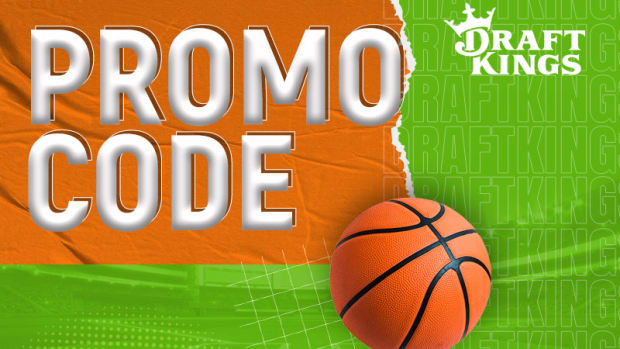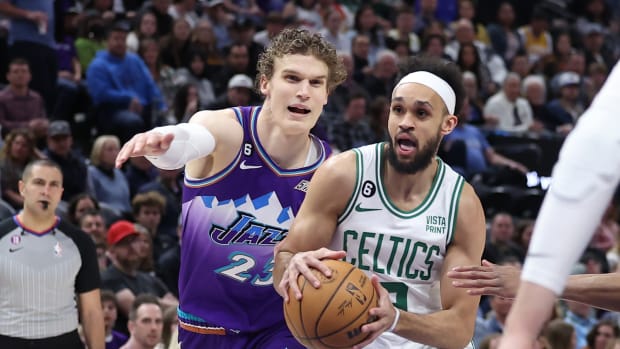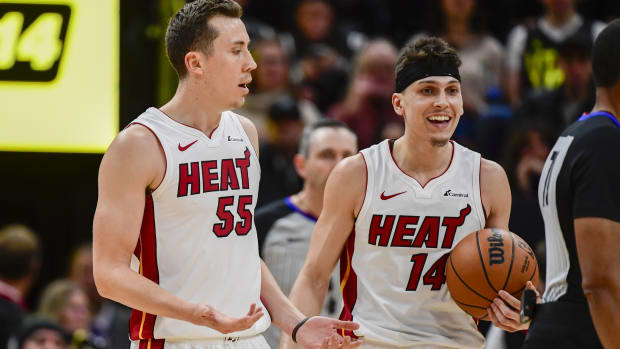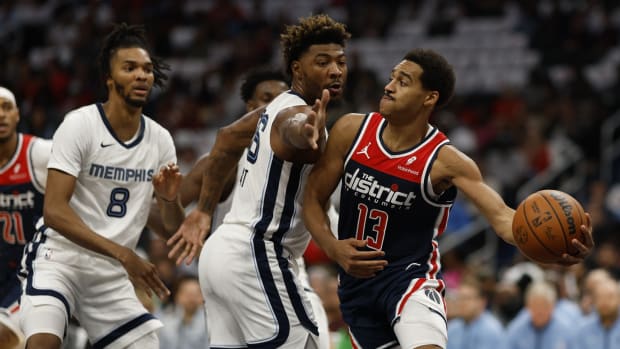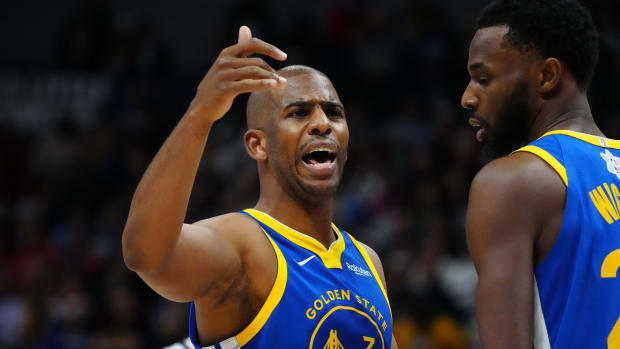Roundtable: Oden vs. Durant
1. Greg Oden hasn't had the smoothest of rookie seasons. On the other hand, in his second year, Kevin Durant seems to have emerged as a multidimensional superstar-in-the-making. Looking back on the 2007 draft, should Portland have taken Durant at No. 1 instead of Oden?
Ian Thomsen: I just don't think it's fair to resolve that question at this time. Oden has been limited to 55 games in his short NBA career. His development will depend largely on his health, so who knows how he'll progress? You can't say he's a drag on the Blazers: At the moment he is contributing to a playoff team, while Durant is a star on one of the league's least successful franchises.
I think Durant is going to be a terrific player, and his Oklahoma City team is positioned to improve this summer -- to the point that next season I'm sure we'll begin to read and hear opinions that Portland picked the wrong guy. But who knows what will happen over the next five years? That's the time frame Oden will require as a 21-year-old center who missed his opening season. Considering last season was a rehab year for him, he's done pretty well to help Portland reach the playoffs.
Jack McCallum: I'm not right about much, but I'm on record as saying that Durant should've been the first pick. I never saw much offense in Oden's game, and it was a huge gamble to believe that he was going to develop it in the NBA. Now, if you thought he would turn into the second coming of Bill Russell, someone who dominated games with shot-blocking and heady defending, well, that's another matter. I thought he would be a really good defensive player, but not in the class of a Russell or even a Dwight Howard or Kevin Garnett.
This is not to jump on Oden. If he overcomes his injury problems, he may become a fine player, but Durant is a future All-Star, no doubt about that.
Chris Mannix: I'm still in the too-soon-to-tell camp on this one. You won't find too many people who don't think Durant is destined to be an MVP candidate in the next few years. He's a polished and dynamic offensive player and, if you believe Thunder coach Scot Brooks, his defense is starting to come along. In Oden's case, we still don't know if he is going to be a part-time player for the rest of his career. Even if he isn't, what I've seen of Oden's offensive game makes me wonder if he will ever develop into anything more than Dikembe Mutombo. Now, I know 30 teams in the league that would take a young Dikembe Mutombo on their roster. But that's not the question, is it?
Steve Aschburner: Picking Oden was the right thing and remains so. If the Blazers had Durant, we'd be wondering if they ever could be physical enough inside with LaMarcus Aldridge or if Joel Przybilla could be the man at center for a championship-caliber team. It's not as if the Blazers lack for what Durant brings to the court, so this question seems all about erasing an alleged mistake in drafting Oden. I don't see it as a mistake -- Oden has plenty of time to get and stay healthy, and have the impact that everyone expected. He's not even holding Portland back yet, because teams that stocked with young talent have to go through their training-wheels phase anyway. If we're still waiting for the big guy six years from now, well, then the question will have answered itself. But it's too early to panic.
***
2. From Mo Williams to Ron Artest to Chauncey Billups to Rafer Alston, some of the NBA's key contributors this season have come via trade. Which deal do you think has had the greatest impact on the season?
Ian Thomsen: Since the Cavaliers have emerged as the best team, Williams has made the most important impact. With him as their No. 2 player, they have a chance to win the NBA title. They wouldn't be as strongly positioned without him.
Billups turned the Nuggets into a contender to reach the conference finals while liberating Denver from the luxury tax -- a huge win-win that is the envy of other franchises. Alston saved Orlando from plummeting out of contention after the season-ending injury to Jameer Nelson. But nothing is more important than winning a championship, and Williams' arrival has created that potential for Cleveland.
Jack McCallum: The real answer to that will come in the postseason, when we find out how far Houston, Denver, Orlando and Cleveland will go. All have high hopes. But since you demand an answer right now, oh autocratic one, I'd say Denver's early-season acquisition of Billups for Allen Iverson and Antonio McDyess (though the latter eventually returned to the Pistons).
It's not like Billups is tearing up the league; he never does. But his steady, one-day-at-a-time leadership makes one believe that the Nuggets, in second place in the West and riding a seven-game winning streak, can win a couple of rounds in the postseason, instead of imploding as they normally do. At the same time, Iverson's change of address has been a major factor in Detroit's becoming a second-rate power in the East.
Chris Mannix: I don't think we're going to truly be able to measure their impacts until the postseason, but right now the leader in the clubhouse has to be Williams. Everyone knew Williams could score -- the phrase "most prolific scorer to ever play with LeBron" was practically tattooed on his forehead when he was acquired from Milwaukee -- but did anyone predict he would be an All-Star? Williams has been a complete player in Cleveland: His three-point percentage (43.4) is a career high and he's getting his 17.9 points (also a career best) on an economical 14.0 shots per game.
Steve Aschburner: Of all those acquisitions, which range from dynamite to transforming, the biggest to me has been Williams to the Cavaliers. The pressure was on Cleveland to take a big step, not just in its progression as a franchise but in its implicit wooing of LeBron for the long term. Landing Williams as a combo guard and LBJ's wingman, at an All-Star level, has addressed both priorities, with the ultimate payoff still to come. Williams has been the sort of player James might have been justified in seeking on some other roster, as he considered future landing spots. That he's in Cleveland, good to go for seasons to come, could ease the superstar's wandering eye. So that one is a high-impact move now and maybe a higher-impact move later.
3. While Major League Baseball and the NFL surround their Hall of Fame announcements with great pomp, basketball's Hall of Fame classes seem in some ways to be an addendum to the Final Four. How can the hoops Hall become more relevant to sports fans?
Ian Thomsen: The future for the Hall of Fame -- just as it is for the NBA -- is to continue to grow internationally. Basketball isn't going to overtake football or baseball domestically; the American audience for those two sports has long dwarfed the NBA. But basketball is growing globally at a much higher rate than the other American sports, and as that growth continues (and as the technology for delivering live content around the world improves via the Internet), the overall audience for basketball should eventually turn the NBA into the biggest league operating in America.
That's why I think the future for the Hall of Fame is to continue to explore its international roots. A good first step has been taken in expanding the international wing of the Hall, and the next phase is to continue to recognize pioneering stars in South America and elsewhere so that the Hall of Fame creates a network that is global and timeless, with basketball fans in every corner of the world feeling connected to Springfield. Maybe I'm crazy, but I can imagine a day when the annual induction to the basketball Hall is a big international event that dwarfs the elections of the baseball and football shrines.
Jack McCallum: The NBA does an excellent job, albeit a protracted one, of rolling out awards during the playoffs, usually finding a way to present, say, the MVP trophy at a home site of a team still active in the postseason. So why not make the Hall of Fame nominees part of that?
Let's say the Bulls make the playoffs this season -- can you imagine what the crowd would be like at the United Center if Michael Jordan were brought back as a Hall nominee? Ditto for John Stockton in Utah and David Robinson in San Antonio. Hall electees will invariably be recognized for their pro careers, so the announcements should be connected to the NBA's biggest event.
Or events. If not the postseason, how about doing it on the Saturday night of All-Star weekend? That's something I'd watch far more closely than the skills competition.
Chris Mannix: I say you line up all the nominees in dunk tanks and drop the ones who didn't get in into ice cold water. Or Jell-O. Look, I don't think it makes much of a difference when you announce the selections. The reaction is going to be the same. Those who get in will get a lot of play in his or her hometown papers (the Utah press has been all over Jerry Sloan's selection) and a few national writers will pen columns agreeing/disagreeing with the choices. But people really start to pay attention in September, when these legends are enshrined.
Steve Aschburner: Basketball is at a disadvantage because it shares its Hall among the NBA, the college game and all forms of international play. Muddies the message, frankly. While there's something cool for the diehards about mixing John Wooden and Julius Erving and Hank Iba and Connie Hawkins, it doesn't make a lot of sense in these niche-marketing days. You don't see MLB and the NFL trying to be all things to all legends.
Still, it is what it is, so where do they go from here?
Well, they could open up the selection process -- the baseball Hall gets tons of publicity because so many voters (baseball writers) speculate in print and on the airwaves as the ballot deadline approaches. Basketball keeps everything under wraps in some star chamber-like committee. The eligibility rules are tricky, too, with candidates coming on the ballot, coming off, then coming on again. Baseball is easy -- wait five years, on for 15, off until the veterans review your case. Timing is also a problem: Since the Hall in Springfield is shared, the finalists get named during the NBA's All-Star weekend and the inductees get announced at the Final Four -- and the crossover audience might be pretty small. Then the enshrinement is held in September, with the football regular season and baseball pennant races dominating the sports scene.
My hunch is the NBA could put together a pretty dazzling Hall of its own, market the snot out of it and hold a regal induction during All-Star weekend. But league honchos probably would overreach and want to hold it at the NBA Store and people's eyes would glaze over.
***
4. The Clippers' Mike Dunleavy has suffered a rough transition from holding the title of coach to holding the title of coach/GM. Clearly, he isn't the first to struggle. Is there a benefit to holding both positions or are teams better served with a separate GM and a separate coach?
Ian Thomsen: Gregg Popovich has both roles in San Antonio, but, in fact, the daily management of the franchise -- including the scouting and trade talks -- is handled by president/GM R.C. Buford, who is among the league's top executives. This kind of situation can only work in a stable environment in which both the coach and his GM are good at what they do and they're able to share responsibility while maintaining respect for one another. A lot of the coaches and GMs in this league are incapable of that kind of relationship. In other words, the coach and GM need to develop a nuanced understanding between them -- and if that kind of understanding is beyond them, then the franchise should revert to the traditional model in which the coach works for the GM and the roles of each job are defined simply in black-and-white terms.
Jack McCallum: In this day and age, there is absolutely, positively no advantage to holding both positions. Think of the most successful franchises over the last few years: Popovich has Buford in San Antonio. Coach Phil Jackson has GM Mitch Kupchak with the Lakers. Coach Doc Rivers has GM Danny Ainge in Boston. Coach Rick Carlisle has GM Donn Nelson in Dallas (as well as an owner sometimes inclined to voice his opinion). Coach (Whoever It Is -- This Year It's Michael Curry) has GM Joe Dumars in Detroit.
There are many, many reasons -- attention to the salary cap and European scouting are two of them -- why the split is necessary, but this is the big one: Everybody needs somebody to argue with. If the only one you have to sell a personnel idea to is yourself, your franchise is in trouble, particularly if your owner is figuratively out to lunch, as is the case in Clipper Land. And don't talk to me about Red Auerbach, who did everything but put the mustard on the hot dogs when he coached and ran the Celtics. These are more complicated times.
Chris Mannix: There is a benefit if the coach/GM knows what he is talking about. The model for the coach/GM is in San Antonio, where Popovich has done a masterful job manning both positions for the last 15 years. But the key to Pop's success has been his ability to bring in smart basketball minds to work under him. On the bench, Popovich had Mike Brown, P.J. Carlesimo and now Mike Budenholzer. In the front office, he had Danny Ferry, Sam Presti and still has Buford. These men are brilliant basketball minds, which is reinforced by the fact that many of them now run franchises of their own. Popovich still has the final say on everything, but his burden is eased knowing that he has competent people working under him. And that's rarely the case.
Steve Aschburner: The only time it works to have one guy wearing both head coach and GM hats is when that guy has proved himself on the sideline first. Like Popovich and, er, Popovich. It's fairly clear that no one ends up on the Spurs' roster whom Pop doesn't want or see a proper use for. It seems to work that way in Utah with Jerry Sloan, even if Kevin O'Connor has the actual roster responsibilities. Generally, though, I say keep the jobs separate. Winning tonight is not the same mission as building a long-term contender, and if the team president isn't capable of distinguishing and evaluating the two people holding those jobs, then he or she should be the one facing extreme evaluation.
That said, I'm having a hard time thinking of examples where an outstanding coach survives two or three underperforming GMs. When GMs finally fall, they usually land on one, two or more of their fired coaches.






























